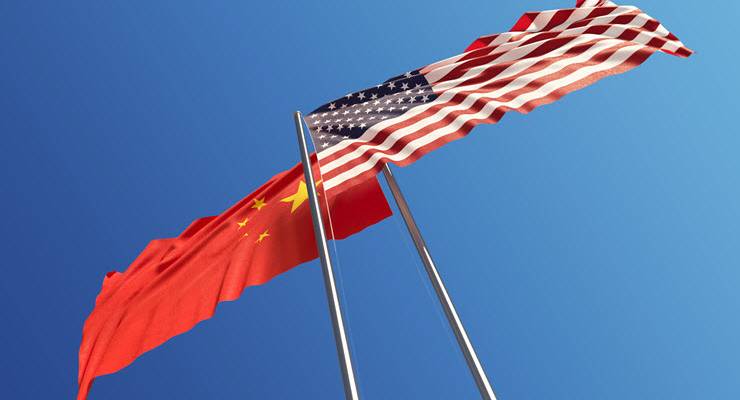
Submarines are stealthy, but trade is stealthier. Both generate security — the former by deterrence, the latter by interdependence. But the kind of security created by trade lasts longer.
Submarine deals are easy to walk away from. Just ask France, which this year lost a longstanding contract to provide attack submarines to Australia. Economic interdependence created by trade deals is harder to unravel. Just ask Donald Trump, who couldn’t break up the North American Free Trade Agreement and had to settle for a cosmetically renegotiated pact.
This contrast highlights the difference between the short-term game Washington is playing in the Indo-Pacific and the long-term one played by Beijing. The United States is betting on the AUKUS security pact it signed with Australia and the United Kingdom, the main feature of which is a promise to deliver submarines to Australia. China is betting on using trade to win over its neighbours, particularly the members of the Association of Southeast Asian Nations (ASEAN), the most successful Asian bloc.
Washington is right on one point. Superficially, the three AUKUS members have strong connections and largely see eye to eye. ASEAN, on the other hand, looks like a ramshackle outfit barely able to manage errant member states such as Myanmar.
The bloc is also struggling to generate a coherent regional response to the growing US-China rivalry. Nor can it calm the troubled waters of the South China Sea. But if ASEAN is too weak to impose its will on its own members, let alone on others, that unimposing weakness is also its strength, allowing the bloc to build trust in the region and beyond.
I first attended an ASEAN meeting as a Singaporean official exactly 50 years ago, in 1971. As soon as I walked into the conference room, I could smell the thick clouds of distrust among the five founding members. Two decades later, when I attended similar ASEAN meetings as the senior official from Singapore, the clouds of distrust had disappeared. Instead the Indonesian culture of musyawarah and mufakat — consultations and consensus — had infected ASEAN. Gradually this culture of consultations and consensus generated geopolitical miracles, some so stealthy that few outside the region have noticed them.
Following the end of the Vietnam War, during which ASEAN supported the US, hostility and distrust between Vietnam and ASEAN were palpable. But when the cold war ended, ASEAN integrated Vietnam into the region’s economy, helping the country emerge as another East Asian economic miracle.
The most important lesson Vietnam learnt from ASEAN was to trade even with one’s adversaries, just like the original members of ASEAN overcame their distrust of one another through trade. That’s why trade between India and Pakistan only tripled from 1991 to 2021, while trade between Vietnam and China — which had fought a war against each other in 1979 — grew 6000 times over. In short, ASEAN’s culture generated peace and prosperity.
Another major ASEAN breakthrough was to generate greater economic engagement between Japan and South Korea. Although the two countries are both US allies, Washington can barely persuade them to talk to each other. Indeed, in recent years, there was neither consultation nor consensus between Seoul and Tokyo. And yet, despite this, ASEAN has persuaded the two East Asian neighbours to sign a free trade agreement among themselves (and with China too): the ASEAN-initiated Regional Comprehensive Economic Partnership (RCEP), signed in 2020 by the 10 ASEAN member states, Australia, New Zealand, China, Japan, and South Korea. Indeed, the economic integration of the powerful Chinese, Japanese and South Korean economies will generate most of the RCEP’s economic boost. It was ASEAN that accomplished this little-noticed miracle.
Here’s a simple word test Washington should carry out. Count which words appears more in the speeches of US President Joe Biden, US Secretary of State Antony Blinken, US Secretary of Defence Lloyd Austin, and White House national security adviser Jake Sullivan (the four custodians of the US’ Indo-Pacific policies): ASEAN and the names of its member states, or Australia.
The answer will be Australia. Washington’s affection for Australia is genuine and its concern heartfelt, which goes a long way towards explaining AUKUS. Yet geopolitics is also a cruel business, where emotions create a competitive disadvantage. If Beijing focuses on ASEAN and the RCEP and Washington focuses on Australia and AUKUS, Beijing will win.
Here’s why. The big game is economic, not military. In 2000, total US trade with ASEAN was US$135 billion, more than three times China’s trade of US$40 billion. By 2020, China’s trade of US$685 billion was almost double the US’ trade of US$362 billion. Washington still sees Japan as an economic superpower. And in 2000, Japan’s economy was eight times larger than ASEAN’s. But by 2020, it was only 1.5 times larger. By 2030, Japan’s economy will be smaller than ASEAN’s.
China’s engagement with ASEAN is deep and broad. High speed railways are being built by China in Indonesia, Laos, Malaysia and Thailand. Amazingly, despite the patent distrust between Hanoi and Beijing, the metro system in Hanoi is being built by China too. And when South-East Asia was looking for vaccines, Chinese vaccines came first. Indonesian President Joko Widodo, a key regional leader, was happily vaccinated with Chinese vaccines.
There’s no doubt that relations between China and several ASEAN states are complicated and face challenges. Yet the range and depth of cooperative endeavours cannot be denied.
And economic ties will grow stronger as the economic miracle growth story of ASEAN is just beginning. Many of the regional economies are at the tipping point of becoming middle-class societies. Australia has 25 million in its middle class. ASEAN will soon have several hundred million. Here’s a leading indicator: in 2020, ASEAN’s digital economy was valued about $170 billion. By 2030, it could reach $1 trillion. This massive explosion of the region’s digital economy will in turn generate new webs of interdependence, strengthening even more the massive ecosystem of interdependence developing in the region.
So, ultimately, this is the strategic choice Washington must face. Focus on selling submarines to Australia — or cross the Rubicon and sign free trade agreements with East and South-East Asia.
And here’s the real kicker: at the end of the day, the Trans-Pacific Partnership was essentially a product of Washington’s talented negotiators, who produced a truly blue-chip trade agreement. After the US withdrew from the agreement in 2017, the revised Comprehensive and Progressive Agreement for Trans-Pacific Partnership remained modelled on the original. But the US cannot even dream of the possibility of rejoining it; by contrast, China has applied to join.
The final question is this: can Washington re-enter Asia’s great economic game? Yes, it can. It still has some assets. Even though China trades far more with ASEAN, US private investment in ASEAN dwarfs that of China. The total stock of US-held foreign direct investment in ASEAN was about US$318 billion in 2019; Chinese investment accounted for only about US$110 billion.
Given the explosive growth potential of the ASEAN region, Washington should find creative ways of driving even more US investment in ASEAN, taking advantage of the huge reservoirs of goodwill towards the US that still exist in the region.
In short, don’t focus on selling submarines. Focus on encouraging US investment and trade in the Indo-Pacific. It’s the economy, stupid.









“the Trans-Pacific Partnership was essentially a product of Washington’s talented negotiators, who produced a truly blue-chip trade agreement.”
An agreement negotiated in stifling secrecy without any attempt at public consultation, completely lacking any democratic authority or mandate, which included that most blue-chip of all features, yet another investor-state dispute settlement provision (ISDS) giving foreign investors and corporations the power to over-rule, for their own ends, Australia’s government and the public interest. I’m not yet ready to weep over its demise.
Huge reservoirs of goodwill that exist in the region? Laos, Vietnam and Cambodia have huge reservoirs of unexploded bombs, huge reservoirs of cripples, poverty and disease. Taiwan and Thailand have huge reservoirs of sex workers and venereal disease. US foreign policy has produced huge reservoirs of graves throughout the region. Why is it that the US and its sycophants think all this translates into goodwill? It’s just not based on reality.
When China gets discussed, I’m always interested to know from commentators ‘Who do you want governing 1.4b Chinese people, if the CCP was to disappear?’ Never had a really sensible response. Remember, we tried this whole ‘let democracy rule’ game with the formerly Soviet Union, and look where we are now. Any way, awaiting to be enlightened. (P.s. no, I am not an apologist for a brutal, self-serving, Chinese elite who swan about under the guise of a socialist/capitalist/authoritarian/paternalistic ‘gentle set of grandparents’.)
“we tried this whole ‘let democracy rule’ game with the formerly Soviet Union”
That’s a ridiculous simplification that mis-characterises the break up of the Soviet Union beyond recognition, beginning with the suggestion that “we”(who is that?) were completely in control, and that what was tried can be adequately described without any qualification as “democracy”, which is a term so abused that it is, as Orwell pointed out several decades ago, quite meaningless.
It’s not an either/or situation. Many would be relieved if the CCP went back to what it was before Xi Jinping.
Who are the “Many”? Xi is exceptionally popular in China.
The population of Taiwan, for a start.
They are not the “Many” and they were stupid enough to put Tsai Ing-wen in charge which was always going to cause issues. Unfinished Civil Wars have a tendency to do that you know.
Certainly that’s the party line in your section of the content farm.
One day there’ll be a memo that mention of Xi is misreporting becaus he is an unperson and you’ll turn on a yuan.
Still just taking potshots and unable to contribute eh Selkie? Your “knowledge” of China certainly matches the educational level required to undertake your low level Public Service processing job at Centrelink.
Leaving aside some questionable details in this column, it really does demonstrate that those brown and yellow-skinned people working on cooperation are a higher form of human social development than those pugnacious, thieving whiteys. Who would have thought?
Interesting read, and more relevant than the local short term or immediate political PR focus of China, trade, defence and the region.
Related, presumably missed or avoided by Australian media, as reported by CBNC (3 Nov ’21):
‘World’s largest trade deal will come into force in January. The U.S. won’t be part of it. The world’s largest trade deal — which includes China and excludes the U.S. — will come into force in January next year. It comes as Australia and New Zealand announced they have ratified the agreement.
The Regional Comprehensive Economic Partnership or RCEP was signed last year by 15 Asia-Pacific countries. The countries are the 10 members of the Association of Southeast Asian Nations and five of their largest trading partners China, Japan, South Korea, Australia and New Zealand.’
Suggests that Australian media are ignorant, inward looking or cautious about upsetting the political PR apple cart on trade with China?